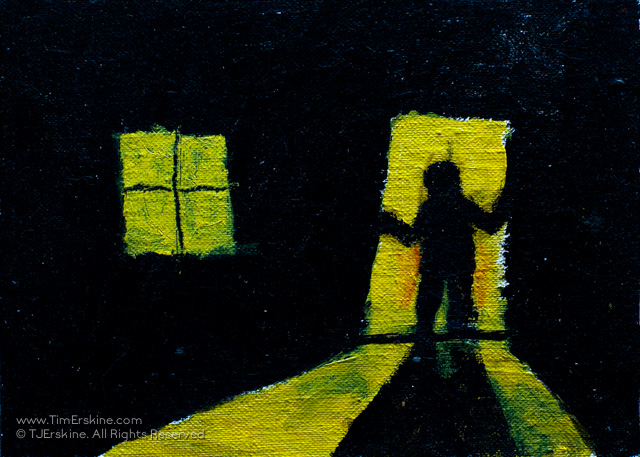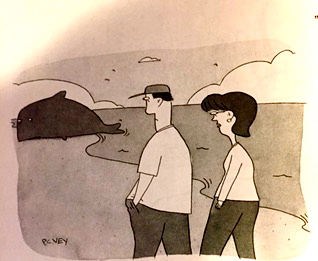Home Movie Facts Fans+Reviews Where to Watch News+Blog Store

What's in your grief toolkit?

Inside or Outside? by Tim Erskine (at age 11)
Right now, people I know are processing varying degrees of situational depression. Situational depression is depression for a reason; it has some similarities to biochemical or idiopathic depression. Idiopathic is a fancy way of saying we are idiots and don't understand the cause. The symptoms are similar. Yet situational depression, or grief, is more likely to resolve or at least transform over time.
Are we done yet? I think part of the frustrating part is there is never a clear boundary point that says, you are done! Time's up! Grief over, all better! It is more that everything changes, including your state of mind.
Death, job loss, disease, divorce, a sudden shock, even moving are all factors where The Depression Gang bangs down the door to camp out in your consciousness for an unexpected stay.
Listlessness, Apathy, Irritability, and Anxiety track their greasy fingerprints over your thoughts, smoking their rancid cigars, polluting your view of the real world. You wonder, how long will these rotten feelings infest your outlook? How do you cope in the meantime?
Recognize it. Name it. Grief comes in all sizes. Don't beat yourself up for grieving over "little" things like the death of a pet. That's one of the most devastating things I have ever experienced and I know I am not alone. It might be an abrupt, unexpected shock, like an accident. Or it could be the slow drip, drip, drip of a gradual, expected loss like watching dementia chip away at a loved one's identity.
The Big Surge. That's what Tim and I call it, when you wake up and your dawning consciousness remembers...OH THAT happened. It's like being hit in the head with a hammer. Waking up with The Big Surge is normal.
The nice thing about getting older it is that age bestows on us a larger, craftier tool box to deal with inevitable sorrows life hurls at us. Instead of getting all broken up about not getting a cookie, we learn to deal with larger losses. This is basis of the seemingly paradoxical U-shaped curve of happiness social scientists speak of which holds for at least higher-income countries; where general happiness goes through a low point around 35-50 years and then climbs up again despite the instabilities of aging, presumably through our acquisition of wisdom and coping strategies.
Over forty-five percent of the population is over 65 in the little rural Wisconsin town where I live. Our demographic is the butt of local jokes but I like it. I'm surrounded by people rich in knowledge and history. I'm amused, if not bemused, to be generally regarded as a youngster (I turn 51 in a week). Everywhere I turn there are people older than me, though regardless of our outsides I suspect we all feel young on our insides. I'm continually reminded of the sort of realities I will likely face. I am going to be one of them soon.
It seems to me that as consider the profound loses experienced by my elders and peers–some have lost spouses, parents and family–I fear I had better keep
adding more tools to my grief tool kit if I want to climb up this last curve. I wonder how they have done it. I am surrounded by a populace of walking
talking memento mori.
I had better learn from these people, I think. I am not sure how. It is scary.

Forget-me-nots by Tim Erskine
This topic is too big for me to take on alone. I had trouble starting this article, and trouble finishing it. I was daunted by the sheer scope of it. I'll just have list a few recommendations, and let other people add what's worked for them. I can't cover it all. I don't want to come across as glib. Got grief? Put on your happy music and dance! That is not what I want to say.
It is temporary and natural. And it sucks. The most useful tool for me in grieving periods has been keeping quite firmly in mind that the pain is a healthy normal response and that it transforms, sometimes taking years, but will remodel into some other expression. The certainty that your feelings will change helps when you get impatient with the discomfort.This is like having a really bad flu of the heart that will last a long time and I have to be patient, I told myself repeatedly, after someone I loved had died several years ago. I had to trust that healing would happen, and it did, though it did take years before I woke up and declared the feeling had substantially changed. It felt like the pointy-shaped object in that got stuck in my chest got tumbled around so often that the sharp edges wore off.
Tell people you trust that you are grieving. Ask them if you can talk about it. They don't have to do anything but listen. Often people just don't know what to say, so they say too much or too little, and all they need to do is listen, or be physically near the grieving person. I felt like a dope when a grieving friend suggested people need to try the simple phrase, "Do you want to talk about it?"
Why hadn't I thought of that? I felt stupid. That's a keeper for me.

"Darn he's seen us. Now we have to act all compassionate."
Cartoon by PC Vey. People often don't know what to say. Sometimes all they need to do is listen.
Reframe associations if you can.
One May over two years ago my mom, who lives in Colorado, visited me. It was bittersweet. Hanging over me was the weighty understanding that she would probably never again be able to visit me at my home in Wisconsin. It would become too hard, unless I had her moved into assisted living here, and who knew what part of her mind would be left by then?
We had just learned from her three-day hospital stay that she did not have a treatable form of dementia called normal pressure hydrocephalus. Even her neurologist had been cautiously optimistic that she presented with the classic signs of NPH which could be treated with surgery. But the answer was a crushing no. Her three-day lumbar drain experiment predicted that surgery to install a brain shunt would not resolve her symptoms.
At least I had ruled that out as an option, I told myself. At least I tried. Out of options, all that remained was to watch her disease progress. During her visit in Wisconsin I felt I had limited time to ask her an important question. As we went for a walk down my street, among the white trilliums and yellow lady slippers, I was not able to ask her without crying.
"I need some help. How would you recommend I deal with your death? After you are gone?"
She paused along the way, looking out over at the apple orchard as if to collect her thoughts. Then she quoted a rather sentimental old poem.
"I am aware, I am aware, that you are there, as I go commonly sweeping the stair..."
It was some poem that her mother liked to recite*. Her parents taught college literature and English and loved to quote poetry at each other. Her memory
had altered the words. She was trying to express that when I am doing every day things like cleaning, I should remember she is all around me.
Now whenever I sweep my stairs, which is almost daily what with four cats coating them with their hair, it's hard for me not to think of her reciting this.
"I'll be all around you!" She continued, sweeping her hand out to the woods around me. "I'll be in the flowers and the fields!" It was a reassuring statement, but I remember sourly thinking at the time, Bait and switch. I don't want trilliums and lady slippers, damnit. I want my mom.
So I have an association of sweeping my stairs and my mother's ongoing illness. I have chosen to make this a comforting association, although that has
taken some mental gymnastics. I may have to keep working on it. She meant the association to be comforting, so that is how I will work to
picture it.
The pain you feel is not an illusion, even if you can't point to a physical injury. Research suggests your brain doesn't distinguish between a broken leg and a broken heart. There is overlap in brain areas activated for both. (You can tell yourself it is completely normal to feel this way. Chastising yourself for your inexplicably uncomfortable feelings only makes you feel worse.
Depression fogs your memory. As if it weren't bad enough, you can't think clearly. But there are ways to fight this, beyond the usual tricks of writing things down and making lists of everything. (One surprising way to fight this particular biochemistry is to exercise; see below.) The depression-bad memory link is well-established, and mechanisms have been put forth. For example, chronic exposure to the stress hormone cortisol negatively affects one of the main memory centers of your brain , the hippocampus, making you forgetful.
People with depression also have distorted recall. They seem to be wearing the opposite of rose-colored glasses when asked to remember events. It's as if they can only open file cabinets in the mind labeled "negative", and all the positive memories remain locked away. When asked to remember a party, depressed people make more generalized and negative statements like "I hated parties when I was a teenager" rather than a single specific positive memory.
Consider the method of loci to retrain your memory. Tim Dalgleish is a researcher at the University of Cambridge who has had some success with depressed patients using this ancient Greek memory trick. He was able to retrain their minds to remember a more realistic proportion of positive memories. First, here is how you would use the method of loci to remember a shopping list:
First imagine a familiar route, like a path inside your house, from one room to the other, or outside your house. This is a path you can easily walk in
your imagination. Maybe it is a place that is not your house but very familiar to you. Write down ten posts along the way. You have to be able to visualize
these places easily.
1.Your front door
2. Your driveway
3. Your mail box
4. the neighbor's house, (or apple tree, store, signpost, etc)
Now for each item on your list that you want to remember, associate each post with the item. (A shopping list: Bread, toilet paper, apples, greens)
1. Bread: your front door is made of a giant piece of bread. Absurdity is a plus. Bizarre images are more memorable.
2. Toilet paper: Your driveway is covered with toilet paper.
3. Apples: Your mailbox is filled with apples, in fact they are spilling out onto the ground.
4. greens: The neighbor's yard is filled with a lush forest of salad greens.
and so on.
So, when you are at the store, trying to remember items on your list, you imaging the posts or loci, and the items on the list are linked to the loci.
Instead of items on a shopping list, Dalgleish had study participants remember their real, positive memories. After training them to travel on this route in their imaginations, their recall of past positive events became more realistic and less distorted. I already have an association of my stairs with my mother's comforting presence.
You can listen to an interview of Dalgleish here.
Or try a color-coded version of the method of loci. The method of loci is not something I have tried myself; I tend to automatically mentally color-code everything with my synesthesia which I involuntarily use as a memory aid. My color-coding habits had me inventing another possible tool. Imagine each color of the rainbow, using the mnemonic of the imaginary and colorful character's name, Mr. ROY G. BIV (red, orange, yellow, green, blue, indigo, violet.) Write down a positive memory or something you are grateful for, for each color, and walk the rainbow in your mind on a regular basis.
Make a list of your tools.
Have handy your personal Grief Tools to jog your memory. Anything from being with friends, taking baths, exercise, creating art, getting therapy...I
have big tools and little tools, even silly tools. One of my silly tools is to search and destroy any earworms that hit me, as they really intensify
any negative moods I might have. I get several infestations a day and I have learned to nip them in the bud or else everyone suffers. When you think
of another tool, add it to your list.
Do the dance. On one hand you hear that it is healthy to experience the grief. On the other hand too much pain for too long will harm you if it deepens the wound that is already there. How do you find a balance?
You may be experiencing the pain, then backing out of it it or distracting yourself, and then diving back into the pain. Back and forth, remembering, not remembering, remembering, not remembering. This seems healthier than to be simply stuck on one side of this dance. Whatever state you are in, to not beat yourself up for being in that state.
There are emotions that competitively interfere with pain such as curiosity, awe, love, and gratitude. And humor! At first it will be hard to find a balance and seem impossible to back out of the pain. Another trick is to not get stuck in numbing distractions.
Buddhist nun Pema Chodron has spoken how it is human nature to want to seek numbness or intensity. Both
remove us from the moment. It is a tricky dance is to learn to be in between, in reality, and to not fear it. I do believe that is where the real joy
lies, however.
If you are stuck for too long one side of the numbness/intensity dance, seek professional help. This goes for both the numbing distraction side or the intense pain side. If your professional help is not helpful, find other professional help. I have had both wonderful professional help and ridiculously horrible professional help. (I was once told as a teenager by a licensed psychologist that she felt I had a curse placed on me and that I needed to be exorcised. She was serious. Wow. I never did get myself exorcised, sorry folks.)
Stand back! We are about to use logic. Understand the negative bias illusion. Negative bias is our natural tendency to overestimate threats and underestimate rewards. Evolution has strengthened our tendency to assume lions are behind every bush, because threats can kill us and rewards won't. Sticks kill, but carrots don't. People who think lions are behind every bush tend to live longer and have more offspring. Jumpy, unhappy offspring. That's us. But lions are not behind every bush. Dispelling thought distortions like negative bias is a key aspect of Cognitive Behavioral Therapy or CBT. CBT works well for highly motivated and logical folks. There are loads of CBT trained therapists, apps, books and tools out there. It has worked well for me.
There are limits to CBT. It is impossible to think clearly when fear and anger cause the fear center of your brain, the amygdala, to capture your frontal cortex, your cognitive executive control. If you are too emotional to think clearly, just recognize you're experiencing an amygdala hijack, and wait for your cognition to come back online. Tim and I find it helpful to signal each other when with "I think I am having an amygdala hijack." It is a call for patience and caring. We both know it is always temporary.

It only seems bottomless.
Little things mean a lot. I flex my gratitude muscles on tiny things every day. The more I do this, I swear, the more automatic it becomes. Sometimes all I can come up with is that I have hands legs, and vision. And I can breathe! I have all these things. Wow! I like to remember the breathing one in particular because we are always doing it so it's always available to tune into and observe. It is a rather marvelous thing we take for granted. I have this inchoate idea that stimulating various sensory awarenesses, like smell, taste, touch, vision, strengthens neurological pathways. In other words, gratitude is a healthy form of neurological exercise. It's bicep curls for the brain.
Express yourself. I journal every day and inevitably it makes me feel better. Even when I have a completely crappy day and do nothing but complain in my journal, I can't help but note the things that are good about my day, too. I don't know what I would do without my daily journaling tool. There are journals that simply prompt you to list a number of things you are grateful for every day if you want to keep it simple. I know journaling doesn't work for everyone. I have friends who must make art to be happy, or music. Healing art mirrors the maker, teaching the maker to love themselves.
Music therapy. Try playing music that makes you feel better. I have been amazed, ever since I was a kid starting piano lessons at seven, at the effect different modes have on people. How can minor modes feel so different than major ones? I recall surreptitiously experimenting with major mode tunes on my family, hoping it would nudge everyone into happier moods. Now the secret is out. I still believe the effect of the right piece of music is like magic.
Move your body to unpetrify yourself. It does not matter how you move it, but move it. In particular anything that gets your heart rate up, even if is as simple as walking, helps. Depression freezes your body through a loop from your brain's amygdala to your motor cortex. It is a protective mechanism. Sensible if you are in war zone, but not practical for daily life. You want to break that loop.
I tame frightened feral cats and some start off literally paralyzed with fear. My vet assures me repeatedly no, they are not blind, they are not lame, they are literally petrified. But it helps to break that barrier to reverse your feedback loop. It's like forcing yourself to smile when you don't feel like smiling. The muscle memory reminds you of neurological pathways that feel more joyful.
If you want reasons for how exercise fights depression, Check out John Ratey's book Spark. It provides a surprising number of
biochemical reasons why movement lifts depression. "Exercise is like taking a little bit of Prozac and a little bit of Ritalin," he writes, referring
to how the boosts in the mood-altering neurotransmitters serotonin and dopamine. Understanding these mechanisms encourages me to exercise daily.
The kind of exercise you do should be what you are more likely to do because it feels good and you like it. whether that is dance, walking, running, gardening. Tim and I have found by experiment that skipping is form of exercise that is particularly hard to do when when you are miserable. Sometimes we suggest we try skipping when we not feeling well. Skipping while sad is a challenge, but it does mess with my head in a good way.
You are not alone. I wish I could find a link to who first suggested this three-part logical sequence of an affirmation that sticks in my memory. It might have been Kristen Neff, who is known for her work on self-compassion. First you comfort yourself by hugging yourself of putting a hand on your heart. Then you say out loud this sequence of ideas:
1. I am suffering.
2. Everyone experiences suffering: suffering is universal.
3. I am not alone in my suffering
*KINSHIP by Angela Morgan
I am aware, As I go commonly sweeping the stair, Doing my part of the every-day care Human and simple my lot and my share; I am aware of a marvelous thing: Voices that murmur and ethers that ring In the far stellar spaces where cherubim sing. I am aware of the passion that pours Down the channels of fire through Infinity's doors; Forces terrific, with melody shod. Music that mates with the pulses of God. I am aware of the glory that runs From the core of myself to the core of the suns. Bound to the stars by invisible chains. Blaze of eternity now in my veins. Seeing the rush of ethereal rains Here in the midst of the every-day air; I am aware. I am aware, As I sit quietly here in my chair. Sewing or reading or braiding my hair; Human and simple my lot and my share; I am aware of the systems that swing Through the aisles of creation on heavenly wing, I am aware of a marvelous thing: Trail of the comets in furious flight, Thunders of beauty that shatter the night, Terrible triumph of pageants that march To the trumpets of time through Eternity's arch. I am aware of the splendor that ties All the things of the earth with the things of the skies, Here in my body the heavenly heat. Here in my flesh the melodious beat Of the planets that circle Divinity's feet. As I sit silently here in my chair, I am aware.
News+Blogs Categories
Archive

